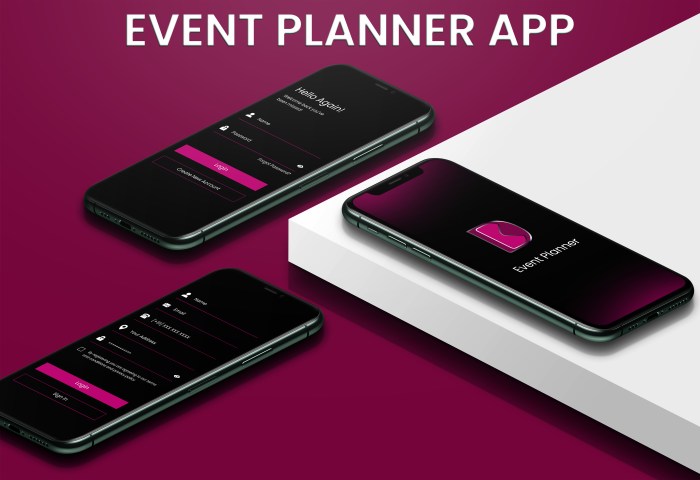Event Organizer App Streamlining Events
Event organizer apps are rapidly transforming how businesses and individuals plan and execute events, from intimate gatherings to large-scale conferences. These applications are more than just digital calendars; they offer a comprehensive suite of tools, integrating scheduling, budgeting, communication, and even marketing functionalities. Their growing sophistication reflects the evolving demands of event planners, seeking solutions that enhance efficiency and profitability across diverse sectors.
This analysis delves into the core functionalities, user experiences, and market trends shaping the event organizer app landscape. We explore the critical features that define these apps, from the basic scheduling tools to advanced integrations and tailored solutions for specific event types, including weddings, conferences, and corporate workshops. The evolving security and privacy considerations, and the impact of market trends and emerging technologies are also examined. A deeper look into successful case studies and future projections rounds out the discussion.
Defining Event Organizer Apps

Event organizer apps have become indispensable tools for planning and executing events of all sizes, from intimate workshops to large-scale conferences. These applications streamline the entire process, encompassing tasks from initial ideation to post-event analysis.
Types and Functionalities
Event organizer apps cater to a diverse range of users and event types. Small businesses may use them for internal training sessions, while large corporations leverage them for complex conferences with hundreds of attendees. Key functionalities commonly found across various event organizer apps include scheduling, budgeting, communication, and task management. Different user roles require varying levels of access and functionalities. For instance, event organizers need tools for managing budgets, schedules, and attendees, while attendees require features for registration, communication, and access to event materials. Vendors and sponsors also need features to manage their presence and interactions.
User Roles and Needs
Different user roles within an event organizer app have distinct needs. Event organizers need comprehensive tools for planning, budgeting, and communication. Attendees need access to event information, registration, and communication channels. Vendors and sponsors require tools to manage their presence and interactions with the event. The app’s interface should accommodate these varying needs, providing intuitive and tailored experiences for each user role.
| User Type | Key Features | Benefits |
|---|---|---|
| Event Organizer | Scheduling, budgeting, communication tools, attendee management, vendor management | Streamlined event planning, improved efficiency, accurate budgeting |
| Attendee | Registration, event schedule access, communication channels, networking tools | Easy access to event information, improved communication, enhanced networking opportunities |
| Vendor/Sponsor | Exhibitor management, communication tools, marketing materials | Enhanced visibility, targeted marketing opportunities, increased engagement with attendees |
Features and Functionality
Event organizer apps offer a range of features to address the diverse needs of event planning. These applications typically include essential features like scheduling, budgeting, communication, and task management. Sophisticated apps also offer robust integration capabilities with other platforms, such as payment gateways and marketing automation tools.
Essential Features and Integrations
Essential features in event organizer apps include tools for scheduling, budgeting, and communication. Advanced functionalities often include task management, vendor management, and attendee tracking. Integration with payment gateways allows for seamless transaction processing, while integration with marketing platforms enables targeted promotion and attendee engagement. The choice of app can vary depending on the price range, with more comprehensive functionalities often associated with higher pricing tiers. Apps are tailored for different event types, from conferences and workshops to weddings and corporate events.
| Feature | Functionality | Example |
|---|---|---|
| Scheduling | Creating and managing event schedules, setting up meeting rooms, assigning tasks | Creating a detailed conference schedule, reserving meeting rooms for breakout sessions |
| Budgeting | Tracking expenses, managing budgets, generating financial reports | Monitoring budget allocation for various event expenses, generating expense reports |
| Communication | Facilitating communication between organizers, attendees, and vendors | Sending event updates, announcements, and reminders to attendees via email or mobile app |
User Experience and Interface
The user interface (UI) and user experience (UX) of an event organizer app are critical for seamless event planning. A well-designed UI should be intuitive and easy to navigate, while the UX should prioritize a smooth and efficient experience for all users. Effective UI design principles include clear navigation, consistent branding, and a visually appealing design. Crucially, the interface should adapt to different screen sizes and devices, ensuring a consistent experience regardless of the user’s platform.
Interface Design and Adaptability
A good event organizer app interface should be intuitive, easy to use, and visually appealing. Clear navigation, consistent branding, and a responsive design are crucial for a positive user experience. The interface should adapt to different screen sizes and devices, from desktop computers to mobile phones, to ensure a seamless experience across platforms.
| App | Interface Design | User Experience |
|---|---|---|
| App A | Clean, modern design with intuitive navigation; clear visual cues for key actions | Fast loading times, easy access to key features, minimal frustration |
| App B | Cluttered layout, inconsistent branding, confusing navigation | Slow loading times, difficulty in finding specific features, high user frustration |

